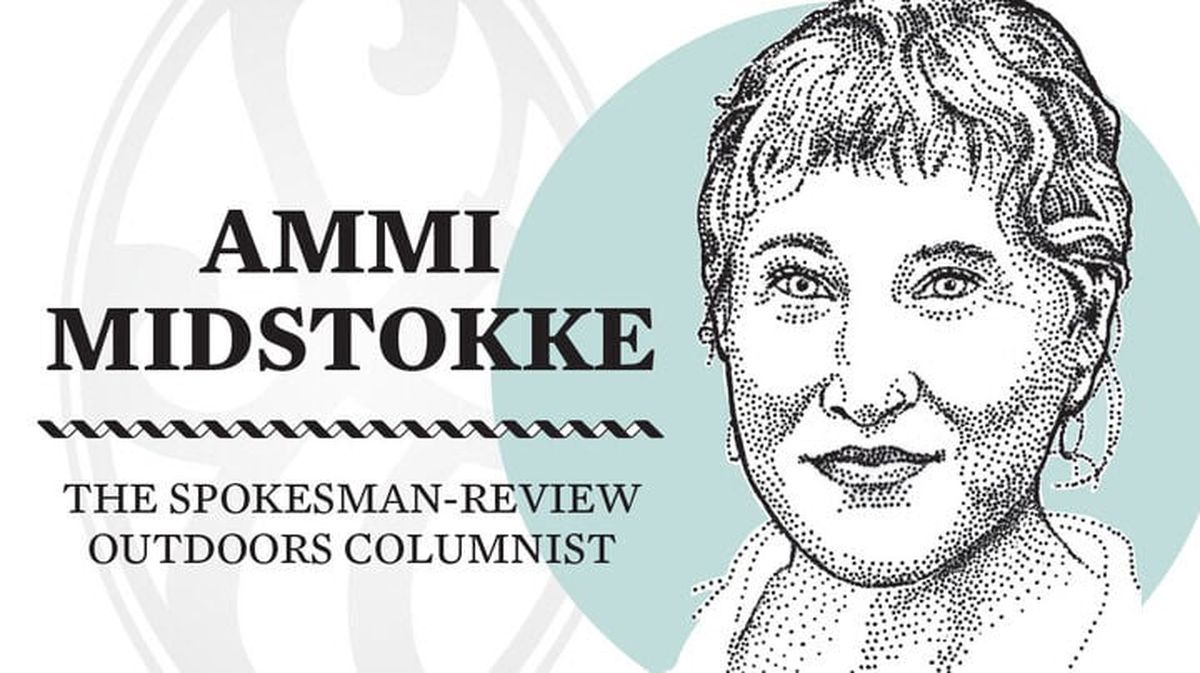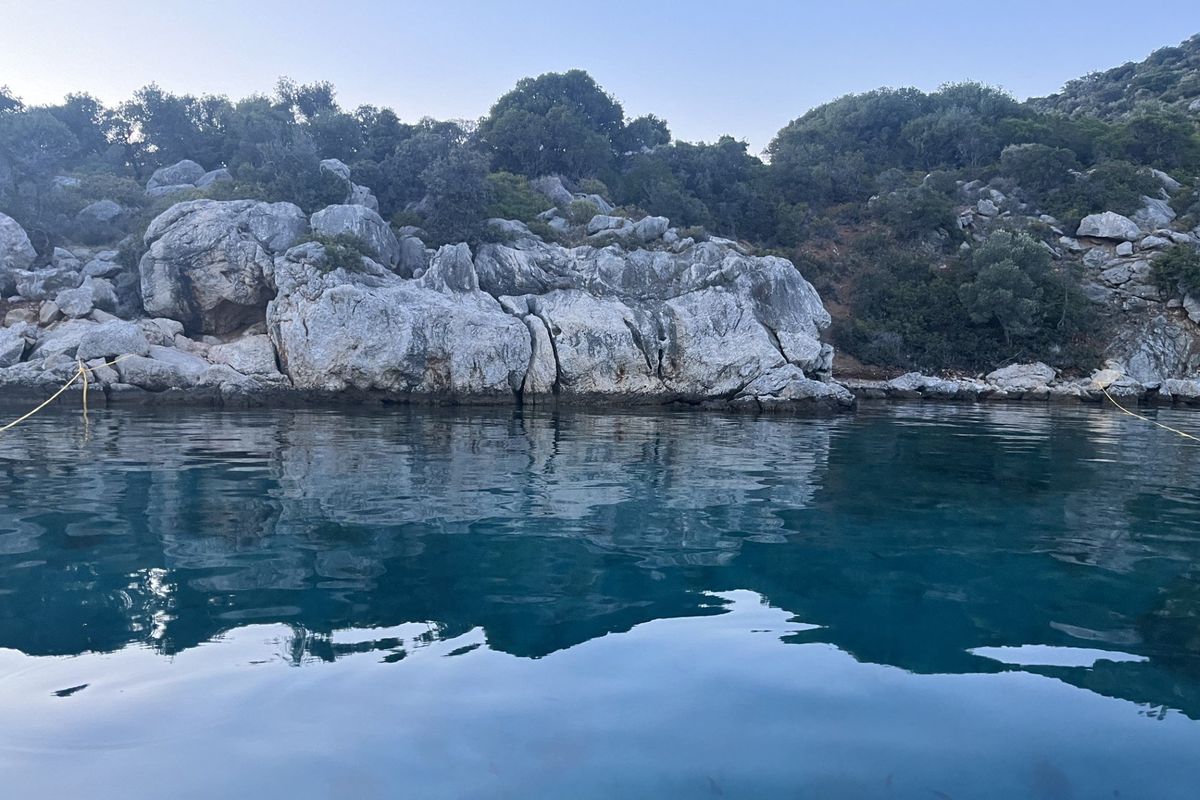Ammi Midstokke: Dispatches from a floating writer
There are few things in life that make you feel like a child again, and swimming with fish in a cave is definitely one of them.
I’m floating toward the tip of an island. It dips into the water, turning its unbleached, barren stones into a tongue of soft yellow of undersea mosses, the tastebuds of the sea. If one holds still and floats like a corpse, shy fish creep out from the submerged island shadows in timid curiosity before swimming by with a bored stare.
My own shadow explodes with rays of sunlight, as if it might like to compete with the miracle beneath me. I hold my breath, partly because I forget to breathe and partly because I haven’t quite mastered the art of snorkeling. When I emerge from the water, I always feel like I’ve been licking the inside of a french fry box.
When the locals joke that it is impossible to drown in their salty sea, they underestimate my lack of coordination. Between swimming, breathing through a tube pointed in an unknown direction, watching out for sea monsters and fiddling with my ever-leaking goggles, the likelihood that I accidentally swim away from the sun is high.
In any case, at the moment I’m in a cave and peering through my dribbling face mask at the blotches of iridescent purple algae and tiny silver fish while hoping that I’ll be able to befriend an octopus. All I meet is a sea urchin and I’ve been warned against their prickly kind, despite how much they remind me of those Koosh balls we loved in the 1990s.
I am also reminded of every screensaver and background picture I’ve used to distract myself from any number of office jobs. Now I am in the picture, sputtering a little between moments of silent reverie. I feel humbled to be invited into this world, that it so patiently tolerates my presence, ignores my haphazard mermaid kicks (the fish are neither impressed nor convinced), and gracefully makes space for my exploration.
It seems pristine. It is not.
On uninhabited shorelines, abandoned ropes try to blend in and rusted ship parts wait for the sea to reclaim them. All manner of the sins of humanity are dumped in these waters, from excess tourism to boats left to commit suicide on the rocks out of their shame of being retired, replaced by better boats. We snorkeled around one, a ghost of glory and industriousness. Now its empty windows are like unseeing eyes watching catamarans drop anchor and plop out tourists like rabbit droppings that bob toward it with the waves, their selfie sticks a mockery of the ship’s forgotten labor.
Maybe it mutely appreciates the attention. Below the surface, it is loved by all manner of sea creatures who have welcomed it toward a slow grave and a new life. I don’t stay long because it feels like sacred ground and I am certain ships have souls, especially this one.
We have been sailing now for three days. Rather, we’ve been on a sailboat for three days, but the wind has been lazy and our motor helped us from island to island in a steady troll through the Aegean. I squeal at the first cave I see as if we’ve happened upon something solitary, made some unknown discovery in these long-sailed waters. I am forever preceded by my naivety.
“Can I go in there?” I ask.
“Yes,” Alex said with the same patience as the fish.
He’s teaching us how to sail, or he would if we were sailing, and my enthusiasm for all things Mediterranean – starting with the weather but not ending with the olives – has not yet worn on him. Even my stack of translated contemporary Greek literature (boat reading) did not cause an eye roll from a man who has mastered the expression.
When Alex rolls his eyes, there is a consecutive series of physiological changes throughout his body, beginning with an inward snort of air, a downward snub toward the right followed by a wide, upward sweeping of his eyes, superseded only by the marvelous loft of his ample eyebrows.
I secretly hope for the opportunity to say something ridiculous to his mother, who I assume has gifted him this fantastic wordless form of profound disapproval. I need to verify the transgenerational authenticity of this particular Greek quality for posterity. I saw Alex’s teenage daughter attempt something similar, but at 15 she’s still lacking the kind of calloused cynicism necessary.
Climate change should accelerate that. In Thessaloniki, the daily temperatures are 14 degrees above average.
It is not mentioned in the books I’m reading. What is mentioned is the perfection of Greek history, told through male authors who vainly attempt to elevate themselves to the same legendary status primarily through the use of adverbs and righteousness. I complain that they write their female characters, devoid of complexity and rich in submission, as if they were describing their ideal wives: Women just a little less smart and a little more willing.
Their cuisine almost makes up for it – probably because it’s the women who have traditionally cooked.
It is clear to me that I am not a child, because my worries are not the worries of my child self. Yet they are the worries of the children. They will inherit the ruins of these ruined places.
When the Acropolis and Parthenon were crumbling in the slow decline of dynasties that left their mark on humanity and history, were the deniers standing idly by counting their gold coins? We mourn these marvels by the millions, but do we see the resemblance? Will our great minds grow too big for our britches?
It is not too late, I say to the fish in a watery prayer to their unhearing ears, as if they might change trajectory by swallowing the snorkelers whole. Maybe a few thousand catamarans. (It is made clear to me by our hosts that catamarans are the bottom feeders of boats and only to be spoken of with chagrin, so I’ll blindly trust their judgment until I learn better or get a dozen angry letters from the public demanding public apology.)
I am distracted from the melancholy of this reality by the simultaneous beauty of it. At night we read the translation of, Ithaca, a poultice of reminding us that the journey has more value than the destination.
I worry we’ve lost sight of the destination because we can’t be bothered to recycle, or ride our bikes, or not have air conditioning. Because I buy too many new clothes and fly to far away places. Even Alex’s theatrical insistence that we wash dishes without hot water seems an impotent offering. We acquiesce while complaining about the grease left on glasses.
I don’t have the solution to these complicated problems, only I know that the more of the world I see, the more I want to learn how to preserve its magnificence. We know it is not any singular change, but all the small changes that we can accommodate into our divergent lifestyles, without shaming each other for the ways in which we fail.
I am convinced we cannot save these wonders without humility, that we must bear witness to the fragility of the world we inhabit.
Anchored to the stones of a tiny island, the last gold of sunlight has long set behind the ridge of wild olive trees and the cicadas are singing a familiar song.
A black goat with skewed horns and a white tail picks his way nimbly down the rocks to drink from the sea, because he knows there is a fresh spring gurgling below the surface. The spiders we survived on our earlier hike are trembling with the abundance of low-flying meals in their webs. The ripples of the water settle into the night with a final sigh toward stillness. They are a crisp azure blue, the iris of the sea’s eye.
When I lean over to see the fish in the evening light, I only see my reflection.
Ammi Midstokke can be contacted at ammim@spokesman.com

